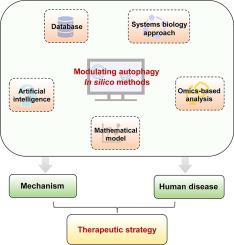当前位置:
X-MOL 学术
›
J. Adv. Res.
›
论文详情
Our official English website, www.x-mol.net, welcomes your feedback! (Note: you will need to create a separate account there.)
Modulating autophagy to treat diseases: A revisited review on in silico methods
Journal of Advanced Research ( IF 10.7 ) Pub Date : 2023-05-14 , DOI: 10.1016/j.jare.2023.05.002 Lifeng Wu 1 , Wenke Jin 1 , Haiyang Yu 2 , Bo Liu 1
Journal of Advanced Research ( IF 10.7 ) Pub Date : 2023-05-14 , DOI: 10.1016/j.jare.2023.05.002 Lifeng Wu 1 , Wenke Jin 1 , Haiyang Yu 2 , Bo Liu 1
Affiliation

|
Autophagy refers to the conserved cellular catabolic process relevant to lysosome activity and plays a vital role in maintaining the dynamic equilibrium of intracellular matter by degrading harmful and abnormally accumulated cellular components. Accumulating evidence has recently revealed that dysregulation of autophagy by genetic and exogenous interventions may disrupt cellular homeostasis in human diseases. approaches as powerful aids to experiments have also been extensively reported to play their critical roles in the storage, prediction, and analysis of massive amounts of experimental data. Thus, modulating autophagy to treat diseases by methods would be anticipated. Here, we focus on summarizing the updated approaches including databases, systems biology network approaches, omics-based analyses, mathematical models, and artificial intelligence (AI) methods that sought to modulate autophagy for potential therapeutic purposes, which will provide a new insight into more promising therapeutic strategies. Autophagy-related databases are the data basis of the method, storing a large amount of information about DNA, RNA, proteins, small molecules and diseases. The systems biology approach is a method to systematically study the interrelationships among biological processes including autophagy from a macroscopic perspective. Omics-based analyses are based on high-throughput data to analyze gene expression at different levels of biological processes involving autophagy. mathematical models are visualization methods to describe the dynamic process of autophagy, and its accuracy is related to the selection of parameters. AI methods use big data related to autophagy to predict autophagy targets, design targeted small molecules, and classify diverse human diseases for potential therapeutic applications.
中文翻译:

调节自噬来治疗疾病:计算机方法的重新审视
自噬是指与溶酶体活性相关的保守的细胞分解代谢过程,通过降解有害和异常积累的细胞成分,在维持细胞内物质的动态平衡中发挥着至关重要的作用。最近越来越多的证据表明,遗传和外源干预导致的自噬失调可能会破坏人类疾病中的细胞稳态。作为实验的有力辅助手段的方法也被广泛报道,在大量实验数据的存储、预测和分析中发挥着关键作用。因此,通过调节自噬来治疗疾病的方法是值得期待的。在这里,我们重点总结了最新的方法,包括数据库、系统生物学网络方法、基于组学的分析、数学模型和人工智能(AI)方法,这些方法旨在调节自噬以达到潜在的治疗目的,这将为更多方面提供新的见解。有前景的治疗策略。自噬相关数据库是该方法的数据基础,存储了大量有关DNA、RNA、蛋白质、小分子和疾病的信息。系统生物学方法是从宏观角度系统地研究包括自噬在内的生物过程之间相互关系的方法。基于组学的分析基于高通量数据来分析涉及自噬的生物过程的不同水平的基因表达。数学模型是描述自噬动态过程的可视化方法,其准确性与参数的选择有关。人工智能方法利用与自噬相关的大数据来预测自噬靶点、设计靶向小分子,并对多种人类疾病进行分类以实现潜在的治疗应用。
更新日期:2023-05-14
中文翻译:

调节自噬来治疗疾病:计算机方法的重新审视
自噬是指与溶酶体活性相关的保守的细胞分解代谢过程,通过降解有害和异常积累的细胞成分,在维持细胞内物质的动态平衡中发挥着至关重要的作用。最近越来越多的证据表明,遗传和外源干预导致的自噬失调可能会破坏人类疾病中的细胞稳态。作为实验的有力辅助手段的方法也被广泛报道,在大量实验数据的存储、预测和分析中发挥着关键作用。因此,通过调节自噬来治疗疾病的方法是值得期待的。在这里,我们重点总结了最新的方法,包括数据库、系统生物学网络方法、基于组学的分析、数学模型和人工智能(AI)方法,这些方法旨在调节自噬以达到潜在的治疗目的,这将为更多方面提供新的见解。有前景的治疗策略。自噬相关数据库是该方法的数据基础,存储了大量有关DNA、RNA、蛋白质、小分子和疾病的信息。系统生物学方法是从宏观角度系统地研究包括自噬在内的生物过程之间相互关系的方法。基于组学的分析基于高通量数据来分析涉及自噬的生物过程的不同水平的基因表达。数学模型是描述自噬动态过程的可视化方法,其准确性与参数的选择有关。人工智能方法利用与自噬相关的大数据来预测自噬靶点、设计靶向小分子,并对多种人类疾病进行分类以实现潜在的治疗应用。



























 京公网安备 11010802027423号
京公网安备 11010802027423号